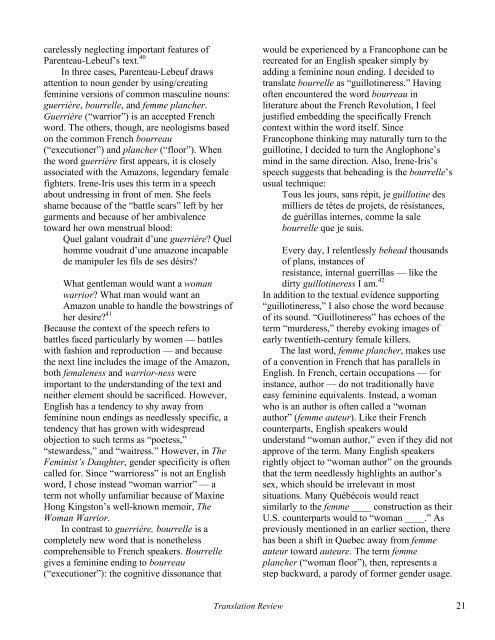Translation Review - The University of Texas at Dallas
Translation Review - The University of Texas at Dallas
Translation Review - The University of Texas at Dallas
You also want an ePaper? Increase the reach of your titles
YUMPU automatically turns print PDFs into web optimized ePapers that Google loves.
carelessly neglecting important fe<strong>at</strong>ures <strong>of</strong><br />
Parenteau-Lebeuf’s text. 40<br />
In three cases, Parenteau-Lebeuf draws<br />
<strong>at</strong>tention to noun gender by using/cre<strong>at</strong>ing<br />
feminine versions <strong>of</strong> common masculine nouns:<br />
guerrière, bourrelle, and femme plancher.<br />
Guerrière (“warrior”) is an accepted French<br />
word. <strong>The</strong> others, though, are neologisms based<br />
on the common French bourreau<br />
(“executioner”) and plancher (“floor”). When<br />
the word guerrière first appears, it is closely<br />
associ<strong>at</strong>ed with the Amazons, legendary female<br />
fighters. Irene-Iris uses this term in a speech<br />
about undressing in front <strong>of</strong> men. She feels<br />
shame because <strong>of</strong> the “b<strong>at</strong>tle scars” left by her<br />
garments and because <strong>of</strong> her ambivalence<br />
toward her own menstrual blood:<br />
Quel galant voudrait d’une guerrière? Quel<br />
homme voudrait d’une amazone incapable<br />
de manipuler les fils de ses désirs?<br />
Wh<strong>at</strong> gentleman would want a woman<br />
warrior? Wh<strong>at</strong> man would want an<br />
Amazon unable to handle the bowstrings <strong>of</strong><br />
her desire? 41<br />
Because the context <strong>of</strong> the speech refers to<br />
b<strong>at</strong>tles faced particularly by women — b<strong>at</strong>tles<br />
with fashion and reproduction — and because<br />
the next line includes the image <strong>of</strong> the Amazon,<br />
both femaleness and warrior-ness were<br />
important to the understanding <strong>of</strong> the text and<br />
neither element should be sacrificed. However,<br />
English has a tendency to shy away from<br />
feminine noun endings as needlessly specific, a<br />
tendency th<strong>at</strong> has grown with widespread<br />
objection to such terms as “poetess,”<br />
“stewardess,” and “waitress.” However, in <strong>The</strong><br />
Feminist’s Daughter, gender specificity is <strong>of</strong>ten<br />
called for. Since “warrioress” is not an English<br />
word, I chose instead “woman warrior” — a<br />
term not wholly unfamiliar because <strong>of</strong> Maxine<br />
Hong Kingston’s well-known memoir, <strong>The</strong><br />
Woman Warrior.<br />
In contrast to guerrière, bourrelle is a<br />
completely new word th<strong>at</strong> is nonetheless<br />
comprehensible to French speakers. Bourrelle<br />
gives a feminine ending to bourreau<br />
(“executioner”): the cognitive dissonance th<strong>at</strong><br />
would be experienced by a Francophone can be<br />
recre<strong>at</strong>ed for an English speaker simply by<br />
adding a feminine noun ending. I decided to<br />
transl<strong>at</strong>e bourrelle as “guillotineress.” Having<br />
<strong>of</strong>ten encountered the word bourreau in<br />
liter<strong>at</strong>ure about the French Revolution, I feel<br />
justified embedding the specifically French<br />
context within the word itself. Since<br />
Francophone thinking may n<strong>at</strong>urally turn to the<br />
guillotine, I decided to turn the Anglophone’s<br />
mind in the same direction. Also, Irene-Iris’s<br />
speech suggests th<strong>at</strong> beheading is the bourrelle’s<br />
usual technique:<br />
Tous les jours, sans répit, je guillotine des<br />
milliers de têtes de projets, de résistances,<br />
de guérillas internes, comme la sale<br />
bourrelle que je suis.<br />
Every day, I relentlessly behead thousands<br />
<strong>of</strong> plans, instances <strong>of</strong><br />
resistance, internal guerrillas — like the<br />
dirty guillotineress I am. 42<br />
In addition to the textual evidence supporting<br />
“guillotineress,” I also chose the word because<br />
<strong>of</strong> its sound. “Guillotineress” has echoes <strong>of</strong> the<br />
term “murderess,” thereby evoking images <strong>of</strong><br />
early twentieth-century female killers.<br />
<strong>The</strong> last word, femme plancher, makes use<br />
<strong>of</strong> a convention in French th<strong>at</strong> has parallels in<br />
English. In French, certain occup<strong>at</strong>ions — for<br />
instance, author — do not traditionally have<br />
easy feminine equivalents. Instead, a woman<br />
who is an author is <strong>of</strong>ten called a “woman<br />
author” (femme auteur). Like their French<br />
counterparts, English speakers would<br />
understand “woman author,” even if they did not<br />
approve <strong>of</strong> the term. Many English speakers<br />
rightly object to “woman author” on the grounds<br />
th<strong>at</strong> the term needlessly highlights an author’s<br />
sex, which should be irrelevant in most<br />
situ<strong>at</strong>ions. Many Québécois would react<br />
similarly to the femme ____ construction as their<br />
U.S. counterparts would to “woman ____.” As<br />
previously mentioned in an earlier section, there<br />
has been a shift in Quebec away from femme<br />
auteur toward auteure. <strong>The</strong> term femme<br />
plancher (“woman floor”), then, represents a<br />
step backward, a parody <strong>of</strong> former gender usage.<br />
<strong>Transl<strong>at</strong>ion</strong> <strong>Review</strong> 21

















